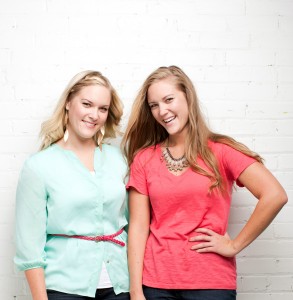
Salt Lake City — Two sisters are fighting Carl’s Jr. and its ads, declaring that women are more than meat.
Lexie and Lindsay Kite, 28, both have doctoral degrees in media and body image from the University of Utah. They run a nonprofit company called Beauty Redefined, and are currently campaigning to raise awareness about sexual objectification in Carl’s Jr. ads.
The nonprofit defines sexual objectification as “the process of representing or treating a person like an object that exists to serve another’s sexual pleasure.” The Kite sisters claim that Carl’s Jr. objectifies women to sell burgers.
“We believe in putting hot models in our commercials, because ugly ones don’t sell burgers,” Carl’s Jr. stated in a press release on its website dated April 27, 2011. Since the mid-2000s the restaurant chain has run advertisements with models eating hamburgers and wearing revealing clothing.
One of the most noticeable Carl’s Jr. ads was released May 17, 2005. It featured Paris Hilton and the new Spicy Six Dollar Burger. Hilton was quoted as saying the ad is “hot,” while Adweek claimed the commercial is “too hot for TV.”
Carl’s Jr.’s ads have attracted attention. “It’s an odd way to sell a hamburger, but in actuality it’s pretty smart,” said Trent Bateman, a 27-year-old BYU graduate. “The use of sex in these commercials is different. You don’t normally see sex trying to sell a hamburger; usually it is something else.”
Some women don’t agree. “The ads were provocative, and I felt like I wasn’t their target audience,” said 26-year-old Katie Barber after viewing the ads for the first time. “Carl’s Jr. is successful in targeting the 18- to 35-year-old male; however, I have reservations about male reactions to the ads.” She termed Carl’s Jr.’s ads “disrespectful and distasteful.”
Beauty Redefined asked Carl’s Jr. about sexism in the chain’s ads. The franchise responded that women are not the target audience and Carl’s Jr. doesn’t care about the sexist portrayal of women. It said Carl’s Jr. is focusing its efforts on males between 18 and 35 years old.
But the Kite sisters do care about how women are portrayed in these ads. Their concern about Carl’s Jr.’s objectifying ads have some academic backing. Experts say media has a strong influence on body image.
Niwako Yamawaki, a BYU professor of psychology, referenced a study in which Pacific Islanders viewed selected media for 15 minutes. The participants began dieting after viewing the media, she said.
The study shows the power of media in influencing people, Yamawaki said. “Stereotype portrayal is real. Media has so much impact on women, especially in career pursuits, academic pursuits and relationships in marriage and dating,” she said.
Carl’s Jr.’s ads may have another, unanticipated effect: alienating potential customers outside the ads’ targeted demographic. “Before I watched these ads, Carl’s Jr. wasn’t that appealing to me. But now that I’ve seen these ads, I will not go to Carl’s Jr.,” Barber said. “I think that these ads are ostracizing customers from Carl’s Jr. They bring in the hungry 18- to 35-year-old males but drive away others such as females and possibly families.”
The ads may catch attention, but some say they are not effective at selling hamburgers even to their target audience.
“I think that Carl’s Jr. is just trying to get attention and create controversy, which is what they are doing,” said Tom Robinson, BYU professor of advertising. “I wonder (what would happen) if we were to show the ad to ten males and then ask them two days later if they could remember what the ad was about. Maybe they could recall Paris Hilton washing a car but not so much about selling a hamburger.” Robinson said more research should be undertaken about the effects of sexual objectification on actual business success.
Regardless of whether the ads sell burgers, the Kite sisters claim they’re effective at objectifying women. Because of the ads’ possible effects on body image, Beauty Redefined has launched an online campaign against the ads. The nonprofit is asking individuals to take a picture with a poster stating, “I pledge to #CutTheCarls. Women are #MoreThanMeat” and upload it to social media. The company also asks supporters to combine efforts to spread the word and boycott Carl’s Jr.




